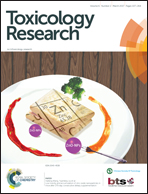Evaluation of the toxicity and pathogenicity of biocontrol agents in murine models, chicken embryos and dermal irritation in rabbits
Abstract
Biological control has emerged as an alternative to the use of crop fungicides in fields and postharvest. It has already been demonstrated that strains of Candida famata, Bacillus subtilis Pla10, Meyerozyma guilliermondii, Meyerozyma caribbica and Debaryomyces hansenii are effective in controlling fungal diseases in tropical fruits. However, in order to develop applications on a field-scale, it is necessary to show that these biocontrol agents are innocuous to humans. In this study, three common toxicity studies were carried out to measure the safety of their use in food products: acute oral toxicity in adult Wistar rats, chicken embryo lethality and skin irritation studies in rabbits using concentrations of 1 and 10 mg of microbial extracts and the administration of 3 and 6 × 108 cells per mL of live cells for each one of the tested strains used for each model. The rats showed no toxic symptoms and none died during testing. The extracts and strain cells under study did not produce a life-cycle interruption in chicken embryos. For the skin irritation studies in rabbits, the substance being studied produced no skin alteration in the animals. With these results it was concluded that the lyophilized extracts in concentrations of 1 and 10 mg, as well as the cells of the studied strains in concentrations of 3 and 6 × 108 cells per mL, were safe in the studied models. Therefore, their use in controlling postharvest diseases in tropical fruits is possible. Their efficiency in controlling plagues in fields and their possible effects on humans, however, require further study.



 Please wait while we load your content...
Please wait while we load your content...